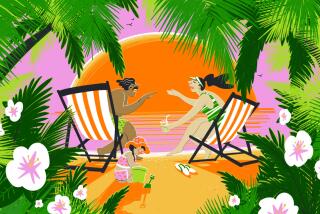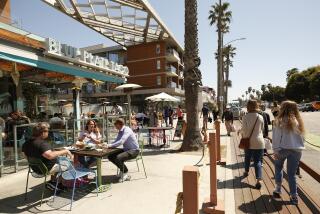When the vacation bubble bursts
- Share via
In the weeks leading up to a vacation celebrating her 10th wedding anniversary, Korey Kealey spent hours planning the trip, poring over books, maps and websites. Each Friday evening, she shared her findings with her husband, Liam, over a glass of wine, and together they planned their itinerary.
They enjoyed every part of their two-week trip through the south of France, agreeing it was their best vacation. Almost as soon as she returned home to the Ottawa area, however, Kealey, a food and nutrition specialist, got caught in a whirlwind of work and family responsibilities. Soon, that relaxed feeling was history.
“We’d looked forward to our trip for an entire year,” she says, “but as soon as we got back, it was like it never happened.”
Kealey’s experience, a recent study says, is not uncommon.
“The direct positive effect of vacationing does not last very long,” says Jeroen Nawijn, an author of a study on vacationing and happiness. “People have to catch up. Usually there is a big pile of work for them when they get back from the holiday.”
Nawijn’s research, published in February in the Applied Research in Quality of Life journal, showed that vacations affect our happiness levels, but perhaps not in the ways we usually think of them.
Nawijn and his team followed 1,530 Dutch adults (974 of whom took a vacation during the 32-week study period), measuring their happiness levels before, during and after their vacations. The results: People got the biggest boost from the time before their vacation — an eight-week positive mood increase — which quickly dissipated after the vacation ended.
Although anticipation can heighten happiness for weeks before a break, positive feelings dropped back to baseline happiness levels almost immediately after the return home. If the traveler had a particularly relaxing or pleasurable vacation, the post-vacation bubble might hold for up to two weeks; if the holiday was stressful or neutral, post-vacation happiness did not increase. The length of your vacation and your overall happiness apparently aren’t related, the study said.
Because you get most of your happiness boost from planning and anticipating, the study suggests that people may get more out of several small trips a year than one big vacation, Nawijn says.
“What you can do is try to compound that by taking more trips per year,” Nawijn says. “Instead of taking a two-week holiday, take two one-week holidays, spaced well apart, to fully enjoy savoring your trip.”
Nawijn has some practical advice for getting the most out of a vacation: “Allow enough time to travel from A to B. Identify what worries you and how to avoid worrying,” he says. “When returning, take a day off to allow yourself time to adjust to everyday life.”
As for Kealey, she’s learned her lesson. “Next time, I’m going to fully enjoy the planning process,” she says. “I’m also going to come back on a Friday instead of a Sunday night. That way, I can ease back into work and family life with enough of a buffer to appreciate the time I had off.”
More to Read
Sign up for The Wild
We’ll help you find the best places to hike, bike and run, as well as the perfect silent spots for meditation and yoga.
You may occasionally receive promotional content from the Los Angeles Times.






